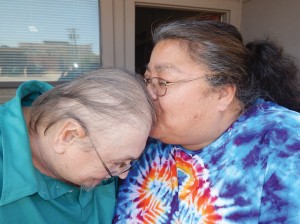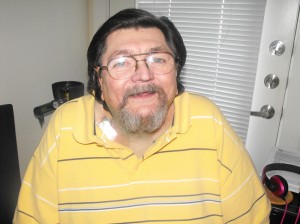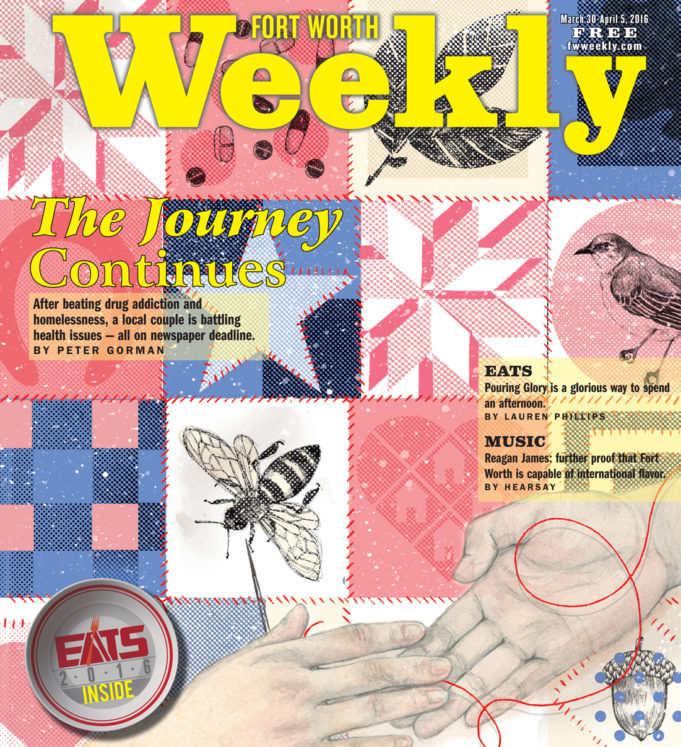Last Saturday, the day before Easter, Stephen Karnes stood on the ground floor porch of his Southside apartment in The Villages at Samaritan House, a nonprofit organization that has been supporting Fort Worth’s homeless community by offering housing and support services for 20 years. It was a beautiful morning, the sun strong and the sky a crisp blue. Stephen, who is 63 and very heavy, leaned against the railing. “It’s a beautiful day,” he said in what’s become a raspy whisper rather than the rich baritone it once was.
He stretched his arms out wide enough to take it all in. “A beautiful day to be alive.”
Stephen just finished his second three-day go-round of chemotherapy. The applicator is still visible beneath the skin of his upper right chest. His hair, thick and longish just three weeks ago, is now down to just a few stray strands. His salt-and-pepper goatee has been reduced to a wispy shadow of its former self.
After his first three-day round of chemo, a couple of weeks earlier, Stephen, an animated speaker, stood on the same small porch and ran his hand through his hair. A large lock came out. He looked at the rich brown hair, let it drop, and said simply, “Shedding,” as if he’d already come to terms with what he was facing.
Asked how he was feeling, how he was holding up, Stephen laughed.
“They don’t have me yet. Doc says the tumors have shrunk enough to try radiation. So this is how I feel,” he said, striking a muscleman pose.

His wife of 21 years, Annette, came out to join him. She’s a large woman with thick black hair –– she admits needing a little dye to help with the gray — and an infectious laugh. “I can’t stand long, but I had to come look at the day,” she said, putting her arm on her husband’s shoulder. He turned and kissed her. She giggled like a schoolgirl, then leaned down — she’s rather tall –– and kissed his nearly bald head.
“I always told him I’d divorce him if he ever cut his hair or beard,” she said. “Now look at him. I guess I’ll just have to make an exception for the chemo and hope it grows back.”
They kissed again. They smiled. Twenty-five years of marriage, years shared drug abuse and homelessness, and now advanced lung cancer for him and Stage 4 kidney failure for her. Some of those things they brought on themselves. Some they had no control over. Nonetheless, they’re still smiling.
“I’m going to get back to the paper,” Annette said, excusing herself. “Deadline’s getting close.”
That paper is The Journey, a bimonthly labor of love that Stephen publishes and Annette puts together. It is their gift to the community that’s helped get them back on their feet. It runs 32 pages and deals with issues related to homelessness, including avaiable community services. It’s sold by homeless people, who get to keep the $2 each paper brings. The idea for it came several years ago, after Stephen had moved to Fort Worth from his previous home: under a bridge in Houston.
“I realized there was an international network of street newspapers that dealt with homelessness and other marginalized groups, and I thought that was a great idea. Each one is independent but run on the same idea, that homeless people have a better chance at success if they’re working. And selling the paper is good work.”
He paused, gathering his thoughts. “This is going to sound funny,” he said. “But when I was a little kid I always wanted to be a train engineer until I heard President Kennedy’s speech, when he said, ‘Ask not what your country can do for you. Ask what you can do for your country.’ After that, I always wanted to help people. I guess I didn’t do a lot of that during my life, but now, with the newspaper, I am finally doing that.”
“We’re doing that,” Annette called from just inside the porch door.
******

Stephen Karnes was born in Dallas to an upper middle-class family. His father was a cable television engineer from its earliest days. His mom and dad got along, Stephen said. He had a younger brother and sister, was smart, and could have done or been anything he wanted. Unfortunately, what he wanted was to get high.
“As a teen I started using drugs,” he said. “That was back in 1968 and ’70. I was smoking dope and dropping a little something here and there. They were crazy times. And then I got in trouble for stealing money to buy speed. I was 17, and that was in Dallas. I robbed a 7-Eleven of $110, and they got me a couple of weeks later.”
It was Stephen’s second brush with the law. A couple of months earlier he had been busted for selling dangerous drugs — he didn’t say what they included — to a narc. He said he had actually sold the drugs to a friend who sold them to the narc, but the friend ratted on him.
He was out on bond for the drug charge when he thought it was a good idea to rob the 7-Eleven. “I was just crazy,” he said. “I wasn’t really addicted to speed, but I was doing it pretty heavily at the time and was crazy.”
He wound up getting tried for both felonies simultaneously and was sentenced to two years for the dope and 10 for the robbery. He served them concurrently, mostly at the Ferguson Unit of the Texas prison system, before being transferred to the Huntsville prison before his release.
The Ferguson prison, Karnes said, was difficult. “It was a tough prison but not for the reasons you normally think. This was tough because it’s got thousands of acres of farmland, and the prisoners worked it. I wasn’t used to working out in the sun picking corn, watermelons, jalapeños. They worked the shit out of us.”
But there was an unexpected bright side to that, too, he noted. “The only good thing about the work was that it created a real camaraderie, and so we all got along inside. That was good. And when somenoe came along who started shit all the time, we just got rid of them. You should just do your time, then go home. Prison ain’t no place for a human being to be.”
Asked how long he actually served, Karnes didn’t bat an eye: “I wound up serving three years, four months, 17 days, 11 hours, 57 minutes, and 38 seconds.”
He didn’t go straight when he got out, but he did go to work for an oilfield machine tool company, taking care of specialty tools for customers. “I worked for them for a couple of good years,” he said. “I had an apartment and a car and was doing good, living in Dallas.”
It didn’t last. He got busted selling weed to one of his co-workers and wound up with one year of probation, a deal he admitted was very lucky, considering he could have been remanded to prison for the remainder of his time. On the other hand, he began to wallow in self-pity and “wound up getting involved in serious dope,” he said.
He said he went back and forth between work and dope. “I finally wound up in drug treatment. Let me say I went to drug treatment after several years. I was doing way too much cocaine, and I thought it was going to kill me.”
He went to the Cenikor Drug Treatment and Abuse Center in Houston for long-term treatment and wound up meeting Annette there –– but not until two years after first seeing her. By that time Stephen was working Cenikor as a manager trainee in admissions and operations, and though he admits he was not supposed to engage with any females there, he said he just fell in love and couldn’t help himself.
******













The next time the Weekly presents an article defending recreational marijuana, remind yourselves of the Karnses. They have in all likelihood taken much more from society than they’ve given, and to portray them as heroes wanting to “give back” is a little rich.
You certainly place yourself in a position to judge others. Apparently you don’t subscribe to the notion that someone can turn their life around and become something better than they were. I’ve worked with Stephen and Annette and, just from your comment, it’s obvious they’re better human beings than you. Thing is, you too can change. Good luck. I feel sorry for you.
Kenneth: You criticize me for judging; then you judge me. Sweet hypocrisy. It’s certainly a good thing if the Karneses have turned their lives around, but a taxpayer always has standing to inquire into the use of his money. And my original supposition has not been rebutted. You know the couple so perhaps you can answer. Did they or not receive more in government benefits than they gave?
Robert: You’re very tough, man. A person might take, or make a mistake, and then change. You want to count your tax dollars on that? You want to know how many kids got through their respective grades based on the school tax you paid, or whether the sheriff actually gave the inmates good tuna sandwiches or lousy tuna sandwiches for which he billed you and me $1 each?
You sound like the father I’m glad I never had. My dad just beat me with a spoon 100 times, or left me in a room for three days with no food or water. That was easy. You sound difficult to please. I’m probably 15 years older than you but glad you were not my dad with all your judgements!!!!!!
Sorry, Peter Gorman, I was born before Feb. 1951, which makes me older than you and the Karneses. And how could you know my age anyway?
Mr. Karnes says 1968-70 were “crazy times” as if dealing pot, dropping acid, and robbing stores was the norm. They weren’t crazy times for me. See, I had a job. When I needed to make a change, I returned to and finished college at age 39. In the following 3 years, I obtained my doctorate, riding a bicycle 6 miles a day roundtrip to save money and keep me fit. Student loans helped; and there was no whining about paying them off. Rather, I paid them off early, ever grateful to taxpayers who financed my degree.
Now I regularly bicycle 4 miles each way to work, not to save money as in the lean years, but to stay fit. Which brings up the Karneses’ health problems. Your article says they are to blame for some of their health problems. Really? Which problems did they not bring upon themselves? It’s obvious that they’re morbidly obese. During your interview, you might have told them that regular exercise and a healthy diet might alleviate some of their problems.
Personal responsibility is what I’m talking about. It’s great that the Karneses are clean now; but pretending that their newsletter repays society for all they’ve taken and continue to take, is a stretch.
Hey Bobby…you taking responsibility for the earth-quakes and rotten air we breathe, and damaged roads and highways you’ve screwed up, and lies you and your butt-wipe buddies told us squares about your gas-drilling racket? The State Pens are full of folks more honorable, humble, and I expect that smell better than you. You dug it, lay down in it. Decent folks don’t want to live on the same street as you. You can put your personal responsibility in your ear. You are a pure loser as a citizen and example for our youth. Our asylums are slam-packed with less deviant souls. Good grief. Fool. Get a life.
This was a nice story about two people keeping good attitudes about life. I found it inspiring. I doubt that recreational marijuana use had anything to do with leading them to pills and crack and other hard drugs that ruined their health but I guess someone could reasonably make that claim. Either way, Robert K. seems kind of heartless in his attitude about them.
Robert K. is the boss of the gas-drilling rats here in Tarrant County and nearby counties. Our Texas jails and asylums are packed with more honorable citizens. My bird-dog Roxy has a much bigger heart, smells better, is smarter, and probably will get to Heaven ( at least has a shot at it… Bobby is a pure looser in that regard). Bobby boy is a black-hearted, Tea-Bagging loser…put him on your Prayer List.